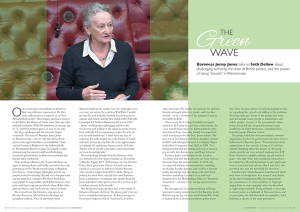Baroness Jenny Jones talks to Seth Dellow about challenging authority, the state of British politics, and the power of being “trouble” in Westminster.

One of the many conundrums in politics is how our politicians represent us. Do they truly understand our concerns or are they divorced from reality? These binary questions seem to be levelled at the House of Lords more than any other political institution. With 850 members, an average age of 71, and 85 hereditary peers, it’s easy to see why.
But dig a bit deeper and this narrative begins to unravel. The story of Baroness Jenny Jones of Moulsecoomb—one of only two Green Party peers in the upper chamber—is remarkable. From a council estate in Brighton to the hallowed halls of Westminster, Baroness Jones has forged a career championing the natural world and challenging successive governments on their environmental and human rights credentials.
Now residing in Dorset, the 75-year-old shows no signs of slowing down and fondly remembers her time growing up on the Moulsecoomb estate in Brighton, East Sussex. ‘I had a happy upbringing as both my parents worked in catering. My dad was a hospital cook and my mum was a waitress. We always lived from wage packet to wage packet, and I didn’t know we were poor until I got to grammar school, when all the other girls had dresses and I only had my school uniform.’
But it wasn’t just the formative experiences at Westlain Grammar School that would shape her perceptive outlook. ‘One of the things about Moulsecoomb’, Jenny recalls, ‘was that, although it was an estate, just across the road was Wild Park. I would go into the park and play football. I had concern for animals and nature, and my first march with CND [the Campaign for Nuclear Disarmament] was in 1968.’
Jones’ working-class upbringing and her early encounters with wildlife at the adjacent nature reserve have evidently left an impression on her. It’s why she can say with confidence: ‘I don’t have any fear of authority. It’s really helped me in the House of Lords and once you are in, you have the same opportunities as anybody. It’s egalitarian, because you’re all Lords. There’s a lot of people a lot richer, and some people are more knowledgeable.’
It’s a refreshing attitude from the Baroness who was introduced to the upper chamber on November 5 (Bonfire Night) 2013. At that time, she was the first Green Party peer in the House of Lords and was joined six years later by Baroness Natalie Bennett, who served as leader from 2012 to 2016. Being in politics for more than a decade has earnt Baroness Jones a reputation as someone who speaks from the heart and whom other peers, when they see her in the corridors, remark ‘hello trouble.’
But being involved in politics and, in the words of Benjamin Disraeli, climbing “the greasy pole”, has not been a straightforward process. As Jenny recognises, the process requires a lot of ‘hard work’, as well as ‘luck, pure luck.’ She credits the moment her political fortunes changed when she stood—and was later elected—to be a member of the inaugural London Assembly in 2000.
‘After a year, the Evening Standard newspaper ranked us all. I came last and was at the bottom. So, I just started being more me. Darren Johnson [the then-Green Party Assembly leader] was important, and I was trying to be like him,’ Jones reflects. She was one of just three Green Party members elected in 2000, and subsequently served as Deputy Mayor under Ken Livingstone from 2003 to 2004. ‘Not feeling entitled and not fearing authority, it meant I got on with Ken Livingstone, and Boris Johnson.’
Baroness Jones’ involvement in the London Assembly, and later the Lords, has not been without attention from the national media. In 2014, she was arrested and later de-arrested after attending an Occupy London protest, and in 2016, it became public knowledge that she, along with other Party members including Caroline Lucas, had been monitored by the Metropolitan Police as “Domestic Extremists”—despite never having committed any crimes.
But the approach of modern policing in Britain represents a deep-seated concern for Baroness Jones. Referencing the latest Crime and Policing Bill, which is backed by the Labour government, Jones warns that ‘there has been plenty of policing legislation; they are squashing free speech and adding to the problems the police have got. Some of the people they have arrested include vicars, people in wheelchairs, and elderly people.’ As part of the government’s plans, police forces will also be granted powers to put conditions on repeat protesters—including those from the group, Palestine Action.
The group, which has been proscribed a terrorist organisation by the UK government, has been cited in Parliament by Baroness Jones. ‘I’m concerned about suppression of free speech, as long as it’s not hate speech.’ Speaking about the actions of the group—which recently saw four arrested breaking into RAF Brize Norton to vandalise military aircraft with red paint—she said: ‘They had committed criminal acts for which they allowed themselves to get caught and went to court and had jail time. But I said that I did not think they met the threshold for terrorism.’
Another topic which Baroness Jones has not shied away from is immigration. In a recent Lords debate on the latest Immigration Bill, she characterised the contributions of other members as ‘claptrap’, urging them to stop ‘spouting’ what she described as ‘right-wing nonsense.’ Being unafraid to intervene in salient topics is a hallmark of Baroness Jones, and its new leader, the self-described ‘eco-populist’, Zack Polanski, is clearly of the same persuasion.
At the Green Party’s latest conference, he courageously declared: ‘Migrants and refugees are welcome here.’ Coupled with a sharp rise in membership numbers, which now overtakes the Liberal Democrats, the party is gaining national momentum. It stands at 12% in the polls and made history by returning four MPs at the last General Election. Jenny certainly agrees: ‘I think we are looking strong and clear, and taking no nonsense’. But, is it enough to challenge another, self-styled populist leader, Nigel Farage?
‘I think we have more and more credibility’, Jenny reflects, ‘Zack’s idea is that people vote Reform because they are disillusioned. I think if we can highlight their flaws, the way to beat them is to actually solve the problems.’
Aside from the swirling debates around immigration and policing, Baroness Jones has used her platform to advance the founding principle of the Green Party of England and Wales: the environment. She has devoted her energy to campaigning on various topics, including climate change and salmon farming.
Asked about the current health of our country’s environment, Jenny commended the role of community activism, but warned of the consequences of politicisation. ‘There are some people taking responsibility for small places, but I don’t think Labour get nature. The Tories talk about nature as if they own it; Labour talks about climate change but can’t extrapolate down. They don’t get that if you start killing off species it actually affects humans. We are in a mess.’
It’s a significant point. Since 1970, UK species have declined by 19% and around 1 in 6 species are now threatened with extinction. It raises serious questions about sustainability and whether enough is being done to protect the environment. In Baroness Jones’ view, policies from central government, such as the introduction of twelve new towns, represent ‘urban sprawl’. ‘They won’t have enough facilities, GP surgeries, independent shops, not enough bus services.’
As for the clean water situation, which is a prescient issue for communities across Dorset, Devon and Somerset, Jenny’s initial optimism for change with Labour has evaporated. ‘Having partially nationalised the railways, I wonder if they got cold feet about the water companies. I thought I would enjoy some of Labour’s policies. Labour has been awful about the water situation.’
As someone who has spoken more than 1,000 times in the House of Lords, Baroness Jones is no stranger to the world of politics. However, the very chamber where she has devoted much of her energies in later life is earmarked for seismic reform. Legislation is currently being scrutinised that would remove the remaining 92 hereditary peers—a move that would not impact Jenny as a Life Peer. But she says the government are doing it in ‘such a mean way’, along with proposals for a mandatory retirement age.
Reform of the upper chamber has already been on Jones’ mind. She and her Green counterpart, Natalie Bennett, tabled a bill which would have created an all elected second chamber. ‘That would include around 300 peers, and it would have still the crossbench element, so that we could have the expertise there.’
Concluding our interview, Baroness Jones reflected on the future of British politics and the next General Election—which is scheduled to take place in 2029. ‘I think Labour they might just hang on, but they will need the Greens and/or the Liberal Democrats as it could be a hung parliament. I don’t think Reform will make the gains it wants to. I think by then we might have woken up to its flaws.’
Seth Dellow has put together a montage of some of Baroness Jenny Jones’ comments in Parliament, which can be viewed here.



